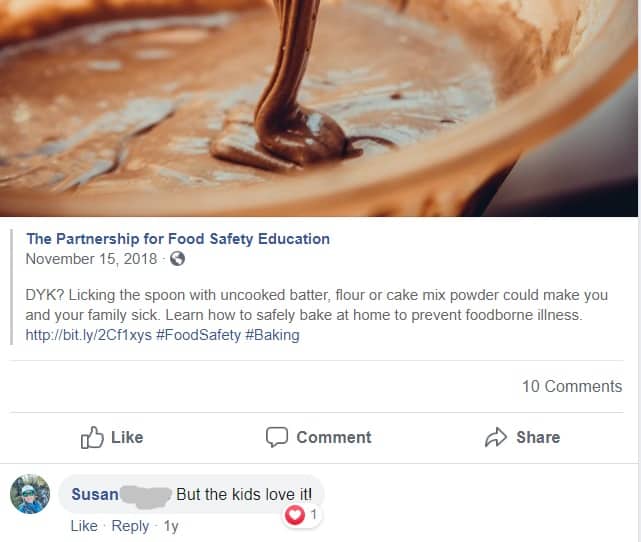I have several friends who devote an entire December weekend to baking holiday cookies to give as gifts. (Lucky me, I am often a recipient). It is only this season that it occurs to me I should be checking in with them to see if they are “cookie dough defiant”.
I borrow the phrase “cookie dough defiant” from Sharon Davis of the Home Baking Association who presented on PFSE’s recent webinar about the safety of raw flour and shell eggs and home baking.
Sharon has put a phrase to something we see a lot — people who just do not want to accept that eating raw cookie dough can make themselves or their kids sick, and then making a defiant stand to continue to sample dough and batter despite the risk.
In reaction to a 2018 PFSE Facebook post, Susan said,” But the kids love it!” and “I’m not sure we will stop, but thanks for the warning.” 
Cookie dough defiance has been promoted by celebrities, too. Ellen DeGeneres (@theellenshow) posted to Instagram, “Has anyone ever really gotten Salmonella from eating raw cookie dough or are they just trying to stop me from living my life?” with a cameo photo of Kermit the Frog.
Yes, Ellen. Someone has gotten Salmonellosis from eating raw cookie dough.
And, as our webinar highlights, E. coli: O157:H7 is a potentially even more dangerous pathogen that has been linked to raw flour.
We asked a live poll question on our webinar – and with more than 100 health and food safety educators responding, we found that even among knowledgeable health and food safety educators, 43% admitted to their cookie dough defiance. 
We’ll be in touch again on this topic. For now, in this holiday season, consider how we can all model behavior — especially for kids — that a baked cookie is worth the wait and the season so much sweeter when we are healthy.
Related consumer messages:
- Do not eat or play with any raw cookie dough or any other raw dough or batter product made with flour that is intended to be cooked or baked.
- Follow package directions on baking mixes and other flour-containing products for proper cooking temperatures and for specified times.
- Wash hands, work surfaces, and utensils thoroughly after contact with raw dough products containing flour.
- Keep raw foods separate from other foods while preparing them to prevent any contamination that might be present from spreading.
Check out the recorded webinar here. CEUs are available for the recorded webinar.
Summary: Outbreaks inked to raw flour (source: U.S. Food and Drug Administration)
- 2009 – Pathogenic E. coli related recall
– Raw, prepackaged cookie dough
– 77 people sick - 2015/2016 – Pathogenic E. coli related outbreak and recall
– 45 million tons of flour (and associated products) recalled
– At least 63 illnesses; 17 hospitalized
– FDA Investigation of Multistate Outbreak of Shiga toxin-producing E. coli Infections Linked to Flour - 2018/2019 – Salmonella outbreak/recall
– Pre-packaged cake mix suspected but not enough epidemiologic and traceback information to confirm consumption of the cake mix
– 7 illnesses
– FDA Investigated Recalled Duncan Hines Cake Mixes Potentially Linked to Salmonella Agbeni Illnesses - 2019 – Pathogenic E. coli outbreak/recall
– Flour
– 21 illnesses, 3 hospitalizations
– Outbreak Investigation of E. coli O26 Linked to ADM Milling Co. Flour, May 2019
- 2009 – Pathogenic E. coli related recall
Other helpful links:
- Raw Dough’s a Raw Deal and Could Make You Sick
- Final Summary: FDA Investigation of Multistate Outbreak of Shiga toxin-producing E. coli Infections Linked to Flour
- What You Need to Know About Egg Safety
Shelley Feist is Executive Director of the non-profit Partnership for Food Safety Education. She can be reached at (202) 220-0651 or sfeist@fightbac.org.